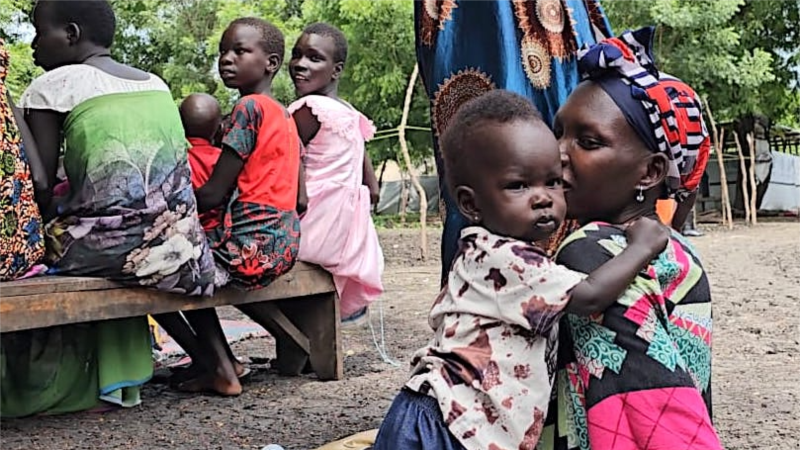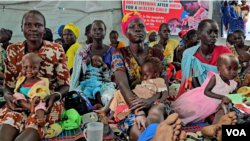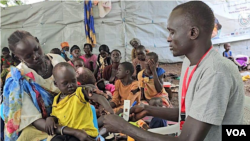This website uses cookies so that we can provide you with the best user experience possible. Cookie information is stored in your browser and performs functions such as recognising you when you return to our website and helping our team to understand which sections of the website you find most interesting and useful.
 Juba, South Sudan —
Juba, South Sudan —
The international community warns that as many as 2 million children and 1 million pregnant or lactating mothers in South Sudan are facing acute malnutrition. Poor access to safe drinking water, sanitation and the spread of disease continue to fuel the crisis.
The latest Integrated Food Security Phase Classification report shows that nearly 8 million of South Sudan’s 12 million people will face acute food insecurity during the 2025 lean season, which begins in April.
The country is still reeling from decades of war and intercommunal violence, UNICEF says, and the world needs to come together to save more than 2 million children and more than 1 million pregnant or lactating mothers from malnutrition.
“The number of children and pregnant and breastfeeding women in need of urgent assistance has actually increased as expected. This is not only due to the current situation but a persistent issue of malnutrition affecting many counties,” said Hamida Lasseko, UNICEF representative in South Sudan.
An influx of 800,000 refugees and returnees fleeing conflict in neighboring Sudan is further straining South Sudan's food security, stretching already limited resources.
In Bor, 70 kilometers north of Juba, Nyantuor Adoor Riak, a pregnant mother of five, has returned home to rebuild her life.
She said when they left during the conflict in 2013, her children were malnourished.
Riak hopes her unborn child will have a healthier future. A small kitchen garden, fenced with old bamboo near her compound, offers a glimmer of hope.
Riak says with the Right to Grow project, her children are now not malnourished. She has learned to plant ground nuts, which, she says, are like the palm nuts given to children in nutrition centers for malnourished children.
For another mother, Anyieth Anyang Deng, insecurity and flooding have turned survival into a daily struggle.
She says at home, insecurity has taken everything, even her cows. When she goes to the forest to farm, it’s not safe. Insecurity is everywhere, she says. She and others used to dig and grow food, but now, that’s no longer possible.
Bor County Health Officer Jacob Ajak sees the effects of malnutrition firsthand.
Ajak says the challenge is the lack of food in the community. If we admit a child today and treat them, they recover, he says. But when they return home, there’s no food. He says there are health centers, but drugs are lacking. The little they have comes from partners like UNICEF. He says when a child gets sick, families can’t afford private clinics.
Save the Children is setting up centers to provide food supplements for malnourished children. But UNICEF says more is needed to prevent and treat malnutrition.
"By 2025, over half a million children will face severe malnutrition, with a high risk of death, if critical services aren’t provided. Another 1.4 million will be moderately malnourished," said Lasseko. UNICEF representative in South Sudan.
The U.K. government, through its Foreign, Commonwealth and Development Office, has challenged South Sudan and the international community to find long-term solutions. Peggitty Pollard-Davey represents the office.
"This IPC analysis is invaluable in ensuring aid reaches those who need it most. But we must also help people support themselves and move away from reliance on humanitarian aid," she said.
Pollard Davey also emphasized the need for collaboration.
"International assistance can save lives, but this level of food insecurity and malnutrition is not inevitable. We must address the root causes to reduce reliance on aid," she added.
South Sudan's malnutrition crisis stems from multiple factors, including poverty, food insecurity, and poor hygiene. Diseases like cholera make the situation worse. Addressing these root causes is crucial to preventing malnutrition and saving lives.



 Africana55 Radio
Africana55 Radio 


